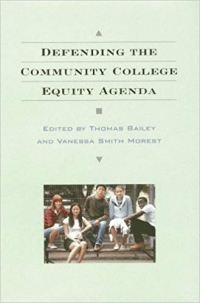
Over the past decade, community colleges have made progress in providing critical access to educational and economic opportunities for many underserved Americans. At the same time, community colleges face increasing challenges, including falling state budgets, a greater emphasis on outcome-based accountability, competition from for-profit institutions, and a growing immigrant student population.
These trials come at a time when community colleges confront crucial economic and workforce development pressures that may impact their mission. How can community colleges continue to maintain their open-door policies and support unprepared students while helping enrolled students complete degrees and certificates that prepare them for economic success?
Defending the Community College Equity Agenda builds on case studies of colleges in six states—New York, Texas, Florida, California, Washington, and Illinois—to offer a frank and fresh new examination of these challenges. Drawing on findings from CCRC fieldwork, the authors analyze how the challenges facing community colleges impact their mission of educational opportunity for all students and propose strategies to strengthen their ability to provide access and help students succeed.
The book includes chapters on community college missions, the accountability movement, impacts of the growth of the for-profit higher education industry, distance education, industry certifications, guidance and counseling, remediation, and dual enrollment.
Contributing authors: Thomas R. Bailey (co-editor), Kerry Charron, Rebecca D. Cox, Kevin J. Dougherty, W. Norton Grubb, Esther Hong, James Jacobs, Melinda Mechur Karp, Vanessa Smith Morest (co-editor), Dolores Perin.
The research and book were made possible with generous support from the Alfred P. Sloan Foundation.
